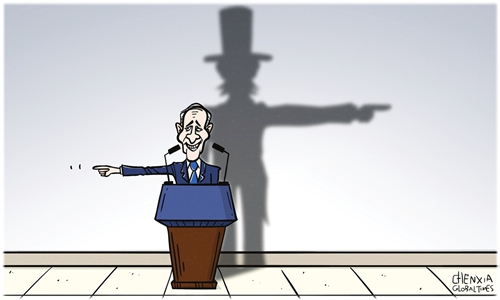
One-man show. Illustration: Chen Xia/GT
Since the end of the Cold War, observers of the US' foreign strategy would acknowledge this trend - US' foreign policy is increasingly influenced by its domestic politics.The main characteristic of this trend is that the formulation and implementation of the US' foreign strategy are no longer guided by rational considerations of the overall national interest or a rational analysis of global issues. Instead, they are noticeably more subject to the influence of US' domestic bipartisanship. The criteria prioritized for formulating and implementing foreign strategy revolve around whether it benefits each party, and how to avoid becoming a target of the opposition during election campaigns and how to provide materials for their political campaigns at minimal cost.
One consequence of this trend is that US' allies will find themselves in an awkward situation. The US, the leader of Western alliance and the sole global superpower, no longer has the will, and possibly even the capability, to continue providing the necessary public goods to fulfill its responsible leadership role. On the one hand, the US demands allies to maintain unwavering alignment and unconditional support for Washington's policies. On the other hand, it explicitly signals allies that it will no longer provide corresponding incentives or rewards.
In his article "India's Tryst with the Asian Century," (originally published in 2020, and included in his new book The Asian 21st Century) former Singaporean diplomat, Kishore Mahbubani, points out, "History teaches us that great powers recede when their domestic problems take priority, just as the British retreated from East of Suez. So, even though Japan and Australia remain staunch allies of the US today, they might be secretly planning for alternative scenarios."
Since former US president Donald Trump took office in 2017, the question of the alternative scenarios has become increasingly delicate and crucial for US allies. Because since then, the domestication of diplomacy is accelerating and spreading comprehensively.
The term "accelerating" refers to relentless strategic planning and policy implementation by the US, driven by domestic political considerations, to reinforce actions against China with significant containment features. These actions include tariffs, sanctions, interventions, disruptions, and even highly symbolic and explicitly targeted military maneuvers.
The term "spreading comprehensively" implies that relevant agendas are constantly extending from traditional political, military and diplomatic domains to trade, finance, society, and culture. In August, a US Congressional select committee has been investigating BlackRock, the world's largest asset manager, and MSCI, one of the biggest providers of index funds, to determine whether they are investing Americans' savings in Chinese companies blacklisted by the US government for security reasons. Earlier August, rating agency Fitch downgraded the US government's top credit rating, due to concerns about the continuous deterioration of the US domestic political environment. This was almost inconceivable five to 10 years ago. Considering the current trends in the evolution of the US domestic political landscape and the absence of a corresponding capability in the political arena, perhaps the timing does come to contemplate Kishore Mahbubani's proposal for alternative scenarios (Plan B).
For the US' allies, regardless of whether they are steadfast allies, making a Plan B is not as daunting as it may seem. It simply requires these countries to approach the evolution of the US foreign strategy with a clear mind, assess the changing global trends and make decisions that are not contradictory to their own national interests. One has probably seen it on the internet: The TV show Utopia satirizes Australian defense policy by saying that increased military spending is intended to protect its shipping routes against China, while noting that China is Australia's major trading partner. So it was basically saying - Australia should be protecting trade with China from China.
However, the reality is even more ironic: Japan and Australia, the allies of the US in the Asia-Pacific region, follow the US foreign strategy in a way that leaves onlookers highly doubtful about their rationality. They stand unwaveringly and inexplicably next to the US, treating China, which clearly has direct and mutually beneficial interests with them, as a rival and enemy.
Undoubtedly, complex reasons and influencing factors are behind the formation of this bizarre situation. But it is believed, and hoped, that all parties can adopt a rational attitude. There's no need to stick to a single path, nor is there a need to get ready for sacrificing oneself even when knowing that the transportation they are on is at risk of derailment and the driver lacks the ability to steer properly.
Regardless of what the possible alternative scenarios may be, it is essential to return to the domain of rational diplomatic strategic decision-making, formulate clear-headed approaches and better pursue one's national interests. Holding onto the olive branch that China has never withdrawn, and responding with equal goodwill and constructive actions should be the shared understanding of all rational decision-makers.
The author is a director of the International Research Institute of Global Cyberspace Governance at Fudan University. opinion@globaltimes.com.cn


